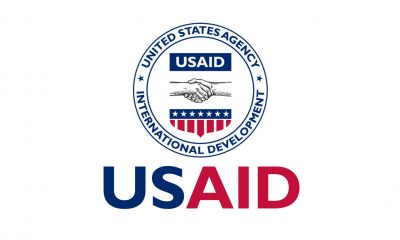Ict/Telecom
Glaucoma: Air Force To Build Data Base
The Nigerian Air Force (NAF) says it will build a data bank of the population with glaucoma at all its commands in order to prevent blindness among personnel and their families.
The Chief of the Air Staff (CAS), Air Marshal Sadiq Abubakar, made the disclosure in Lagos at an awareness campaign against Glaucoma blindness, recenty.
Abubakar, represented by the Air Officer Commanding (AOC) Logistics Command, AVM Ibrahim Yahaya, said the data would assist the service in the expansion and upgrade of its facilities to effectively tackle the condition.
The programme, with the theme “Winning the War Against Glaucoma Blindness”, was organised by the NAF headquarters in conjunction with 561 NAF Hospital, Ikeja.
Abubakar said, “We want them to check their eyes to ensure there are no cases of Glaucoma, and if any, fight it. Glaucoma blindness is preventable if detected early.
“Secondly, we are trying to build a data bank on personnel, both serving and retired with Glaucoma, as well as those without it.
“Such data bank would help us plan appropriately on how to expand our facilities and equip them for better service delivery,” he said.
The Air Force chief said that the eye was a vital organ which nobody would want to lose.
“We do glaucoma awareness annually. We did one in March, but this time around, we decided to embark on awareness and enforcement campaign in all the commands.
“It has been done in Makurdi and Kaduna. Lagos is the third place and I am sure they would proceed to Yenagoa in Bayelsa State and Bauchi,” he said.
Earlier, Chief of Medical Services, AVM Sale Shinkafi, who was represented by Air Commodore Mohammed Shaibu, said the NAF had over the years, provided preventive and curative medical services.
“Like you are all aware, preventive services are cheaper and some of those medical conditions are preventable.
“Blindness from Glaucoma is preventable and the best prevention is early diagnosis.
“Glaucoma does not have symptoms and that is why we have encouraged our people to have their eyes checked once a year, because once the blindness comes, it is permanent,” he said.
Shinkafi said such programmes were organised so that such conditions could be identified in good time.
“We would not want to wait until they are fully established before offering treatment.
“The medical services are free. The checkups and drugs, eyeglasses are free.
“Those who require surgical treatment would also get that for free because the CAS has made adequate provisions for it.
“That is why it is important to have records of those with this problem,” he said.
According to Shinkafi, the enormity of the problem determines how often the Air Force engages in campaign to combat it.
He said that the ratio of Glaucoma cases among personnel and their families is a reflection of what is happening in the society at large.
Ict/Telecom
Technology, Others Responsible For Nigeria’s Bonga Oil Operations
The Managing Director, Shell Nigeria Exploration and Company Limited (SNEPCo), Elohor Aiboni, said Bonga, Nigeria’s first deep-water asset, has recorded major milestones, due to effective leadership, cutting-edge technology, continuous improvement and collaboration with stakeholders.
She noted that since coming on stream in November 2005, Bonga has maintained a track record of production that saw it achieve one-billion-barrel export on February 13, last year.
In her presentation, titled “The Bonga Journey to a Billion Barrels”, at the ongoing 2024 Offshore Technology Conference in Houston, Texas, United States, Aiboni, said: “SNEPCo is grateful for the contributions of all the parties to the Bonga story and we can all be proud of the milestones.
“Bonga has been consistent. In 2014, nine years after coming onstream, it achieved half a billion barrels of crude and doubled it in 2023. We have worked relentlessly to ensure excellent asset management, project and wells delivery and deployment of technology and innovations in our operations”.
According to her, these factors, “coupled with the supportive partnership of the Nigerian National Petroleum Company Limited and our co-venturers – TotalEnergies, EP Nigeria Limited; Nigerian Agip Exploration; and Esso Exploration and Production Nigeria Limited, make Bonga stand out as a world-class investment case”.
She continued that, “SNEPCo also enjoyed the support of the Nigerian Upstream Petroleum Regulatory Commission (NUPRC) and the Nigerian Content Development and Monitoring Board (NCDMB) in the success of Bonga operations”.
Aiboni also listed the challenges of keeping the Bonga Floating Production, Storage and Offloading vessel full as the asset ages and dealing with unexpected developments with subsea wells and equipment.
She said: “SNEPCo responded with a campaign of operational excellence, which among other initiatives, led to the creation of a programme known as the Bonga Business Improvement Plan that continually reviews and identifies improvement initiatives and drives sustainability in operations and upskilling of staff.
“The Bonga success story has been led by Nigerians who have been managing directors of SNEPCo since it was established in 1993, in a deliberate policy by Shell to develop indigenous manpower for deep-water operations in Nigeria.
“Today, some 97percent of the SNEPCo workforce is Nigerian and overall, Bonga has helped to create a new generation of Nigerian deep-water professionals.
“Our vision at SNEPCo remains to be the best deep-water business, powering growth and achieving net zero emissions in line with Shell’s Powering Progress strategy”.
Ict/Telecom
Banks Cut Borrowing From CBN By 44%
Banks’ borrowings from the Central Bank of Nigeria (CBN) fell month-on-month, (MoM) by 44 percent to N12.16 trillion in April from N21.7 trillion in March.
Analysis of latest data from the CBN shows that the 44percent drop represents the first MoM decline in banks borrowing from since January when it increased by 268.7 percent to N3.6 trillion from N976.29 billion in December 2023.
However, further analysis showed that banks’ deposits in the CBN SDF grew MoM by 118.4 percent to N428.97 billion in April from N196.37 billion in March 2024.
Banks make use of the SLF to access liquidity to run their day-to-day business operations while the Standing Deposit Facility window (SDF) on the other hand, is an overnight deposit facility that allows banks to lodge excess liquidity (money) with the CBN and earn interest.
The decline in banks’ borrowing from SLF may reflect an increase in banking system liquidity and also the decision of the apex bank last year to remove the limit on the remunerable daily placements by banks at the SDF.
According to the CBN Governor, Mr. Olayemi Cardoso, the CBN removed the cap on the remunerable SDF to increase activity in the SDF window and manage liquidity.
Ict/Telecom
Expert Highlights Technology Impact On Fintech Industry Growth
A Financial technology expert, Olatunji Akinrinola, has highlighted the exponential growth of the FinTech industry, which according to him, was driven by technological advancements.
Akinrinola made this assertion in a press release recently, where he stressed that the role of technology in driving this exponential growth in the FinTech sector was very outstanding.
According to him, Technology has revolutionised the way financial services are delivered, making them more accessible, efficient, and inclusive.
“Through innovations such as mobile banking, digital payments, and blockchain technology, FinTech companies have been able to reach a larger population and provided them with access to financial services”, he stated.
Akinrinola emphasised the role of technology in enabling financial inclusion, adding: “Technology has democratised access to financial services, particularly in regions with limited banking infrastructure.
“Mobile money platforms and digital wallets have empowered individuals to conduct financial transactions conveniently and securely, without the need for traditional banking services”.
He also underscored the role of Artificial Intelligence (AI) and data analytics in driving innovation within the FinTech industry, noting: “AI-powered algorithms and predictive analytics have revolutionised risk assessment, fraud detection, and customer personalisation in financial services.
“These technologies enable FinTech companies to provide tailored solutions and mitigate risks more effectively, ultimately enhancing the overall customer experience”.
Akinrinola stressed the importance of regulatory frameworks in fostering the growth of the FinTech industry.
“While technology has accelerated the growth of FinTech, it is essential to establish robust regulatory frameworks to ensure consumer protection and maintain market stability. Regulators play a crucial role in balancing innovation with risk management, thereby creating a conducive environment for the sustainable growth of the FinTech sector”, he stated.
Akinrinola underscored the role of technology in driving the exponential growth of the FinTech industry, saying, “Technology has been a game-changer for the FinTech sector, enabling innovation, expanding access to financial services, and driving economic growth.
“As technology continues to evolve, the FinTech industry will undoubtedly play a significant role in shaping the future of financial services ecosystem”.
Corlins Walter
-
Politics16 hours ago
When Women Unite To Pray For SIM
-

 Business14 hours ago
Business14 hours agoUSAID Re-emphasizes Agricultural Collaboration With Nigeria
-

 Featured15 hours ago
Featured15 hours agoWe’ve Only One House Of Assembly Led By Oko-Jumbo, Fubara Clarifies …Signs Into Law N1.188trn Rivers 2025 Budget
-
Business15 hours ago
Agency Partners Foreign Varsity On Climate-Smart Agriculture Advancement
-

 Nation16 hours ago
Nation16 hours agoNUJ backs proposed strike by Lagos-owned media workers
-

 Niger Delta14 hours ago
Niger Delta14 hours agoFouchee Celebrates Asari’s Recognition
-
Niger Delta15 hours ago
NDDC Boss Thanks God For Transformation … Promises More Infrastructural Projects
-
Business15 hours ago
NACCIMA Rep Urges Farmers To Exploit Hybrid Oil Palm Seedlings

